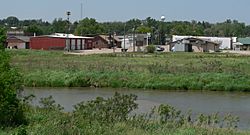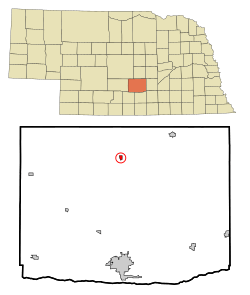Pleasanton, Nebraska facts for kids
Quick facts for kids
Pleasanton, Nebraska
|
|
|---|---|

Pleasanton, looking northwest across the South Loup River
|
|

Location of Pleasanton, Nebraska
|
|
| Country | United States |
| State | Nebraska |
| County | Buffalo |
| Area | |
| • Total | 0.35 sq mi (0.92 km2) |
| • Land | 0.35 sq mi (0.92 km2) |
| • Water | 0.00 sq mi (0.00 km2) |
| Elevation | 2,093 ft (638 m) |
| Population
(2020)
|
|
| • Total | 361 |
| • Density | 1,016.90/sq mi (392.31/km2) |
| Time zone | UTC-6 (Central (CST)) |
| • Summer (DST) | UTC-5 (CDT) |
| ZIP code |
68866
|
| Area code(s) | 308 |
| FIPS code | 31-39450 |
| GNIS feature ID | 2398986 |
Pleasanton is a small village located in Buffalo County, in the state of Nebraska. Nebraska is in the central part of the Midwestern United States. In 2020, about 361 people lived there.
The village was officially started in 1890. This happened when the Union Pacific railroad line was built to reach that spot. Pleasanton got its name because it is in the "Pleasant Valley" of the Loup River. It became an official village in 1894.
Contents
History of Pleasanton
Pleasanton was planned out in April 1890. This was when the Union Pacific railroad built a new line. This line went through Ravenna and ended in Pleasant Valley. This area was also home to an early settlement called Peters' Bridge. The Peters family built and ran a bridge there.
Peters' Bridge was a stop for stagecoaches and freight wagons. A post office was set up nearby in an area called South Loup. This area was known as Riverview when the post office opened in 1883. The first train arrived in Pleasanton on March 1, 1890. Soon, new businesses and buildings were quickly built.
The first schoolhouse was built south of the South Loup River. In 1907, an ice jam caused a flood that reached the school. A new brick school was built on a hill in 1909 to avoid future floods. Pleasanton has faced several challenges over the years. These include a cyclone in 1890 and three fires between 1892 and 1894. Major floods also occurred in 1924 and 1947. The 1947 flood even washed out the railroad tracks. In the 1970s, the village grew, and 40 new homes were built.
Pleasanton Public School
The school in Pleasanton has been open since 1890. It is a Class D2 school, according to the Nebraska School Activities Association. This means it is one of the smaller schools in Nebraska.
Pleasanton Railroad Depot
The Pleasanton Railroad Depot was built in 1890. It is located in the center of town. This depot was part of a big effort to build railroads quickly. In 2005, the village board thought about tearing down the old building.
However, the local high school's Future Business Leaders of America group decided to save it. They worked for eight years to raise money. They got grants and held fundraisers to renovate the depot.
Geography of Pleasanton
Pleasanton covers a total area of about 0.92 square kilometers (0.35 square miles). All of this area is land.
Population and People
| Historical population | |||
|---|---|---|---|
| Census | Pop. | %± | |
| 1900 | 103 | — | |
| 1910 | 252 | 144.7% | |
| 1920 | 262 | 4.0% | |
| 1930 | 282 | 7.6% | |
| 1940 | 235 | −16.7% | |
| 1950 | 188 | −20.0% | |
| 1960 | 199 | 5.9% | |
| 1970 | 261 | 31.2% | |
| 1980 | 349 | 33.7% | |
| 1990 | 372 | 6.6% | |
| 2000 | 360 | −3.2% | |
| 2010 | 341 | −5.3% | |
| 2020 | 361 | 5.9% | |
| U.S. Decennial Census | |||
Pleasanton's Population in 2010
In 2010, there were 341 people living in Pleasanton. These people lived in 140 households, with 93 of them being families. The village had about 1002.9 people per square mile. Most of the people living in Pleasanton were White (99.7%). About 1.2% of the population was Hispanic or Latino.
About 34.3% of households had children under 18 living there. Most households (56.4%) were married couples. The average household had 2.44 people. The average family had 3.05 people.
The average age of people in the village was 35.8 years old. About 28.2% of residents were under 18. About 16.4% were 65 years old or older. The population was almost evenly split between males (48.1%) and females (51.9%).
Old Settlers Celebration
Old Settlers is a fun annual celebration in Pleasanton. It happens on the first weekend of June. Local businesses help sponsor many activities for everyone to enjoy.
The celebration kicks off on Saturday with a parade. There's also a Fun Run & Walk, a carnival, and sports tournaments. You can watch or join 3-on-3 basketball and volleyball games. A community theater play is also part of the fun.
On Sunday, there's a hamburger meal and more sports. People can play in a softball tournament or a paintball tournament. Each year, the celebration has a special theme. The parade floats are decorated to match this theme. The Old Settlers celebration started again in 2003. It had taken a break for 13 years after the village's 100th anniversary in 1990. The Pleasanton Community Improvement Committee organizes this event.
Parks in Pleasanton
Rosalia Klein Park
Klein Park was built in 2008. It was made possible by grants and community volunteers. People worked together to make the park beautiful. It helps make the entrance to the town look nice. The park has a gazebo, sidewalks, seating, and a mural. The mural shows what Pleasanton looked like in the 1900s.
Splash Park
The Splash Park is a mix of a playground and a fountain. It's a fun place for children and families. This park was finished in 2010. It was built with help from a grant. The grant came from the Nebraska Game and Parks Commission.
Churches in Pleasanton
Pleasanton has four churches. The Pleasanton United Methodist Church was founded in 1899. Grace Lutheran Church started in 1906. St. Mary's Catholic Church was built in 1909. A new St. Mary's church was built in 1960. The Pleasanton Evangelical Free Church was established in 1982.
Notable Person
- Win Noyes, a baseball player
See also
 In Spanish: Pleasanton (Nebraska) para niños
In Spanish: Pleasanton (Nebraska) para niños
 | Bayard Rustin |
 | Jeannette Carter |
 | Jeremiah A. Brown |

